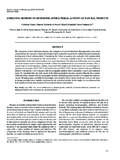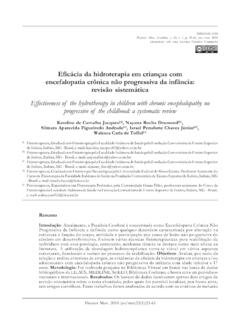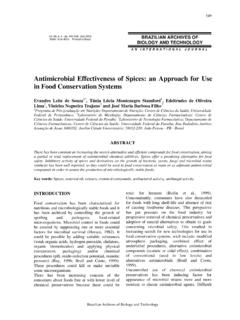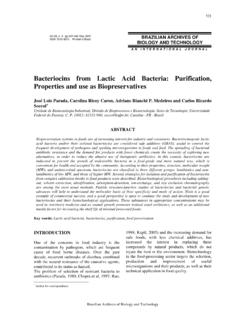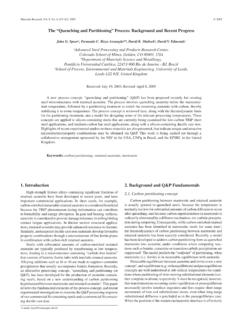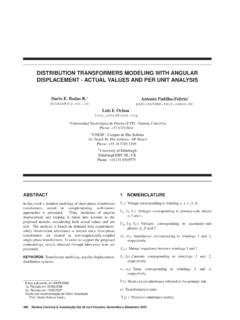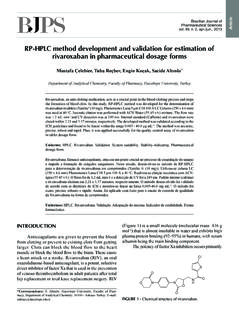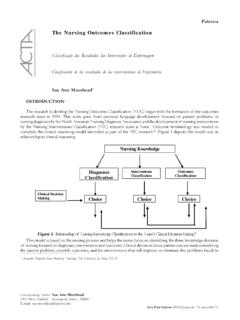Transcription of The commercialization of health care - SciELO
1 842 Cad. Sa de P blica, Rio de Janeiro, 29(5):841-843, mai, 2013 EDITORIAL (EDITOR'S CHOICE)The commercialization of health careThe privatization of health care in countries traditionally known for their strong public systems, such as the UK, Spain, and Sweden, poses a threat to the right to health . In many cases the in-creasing commercialization of health care has been played down, but academic research has a critical role in promoting and further developing this has also witnessed recurrent attempts by business interests in health to lobby govern-ment to increase incentives for a sector that is already heavily subsidized. The Brazilian media recently announced negotiations by the National Executive to cut taxes and expand government financing for private health plans. This news sparked reactions by various organizations. The outrage results from the mismatch in this initiative, given the already low relative share of public spending in health as compared to private expenditure.
2 The chronic underfunding of the Bra-zilian Unified National health System (SUS) and the increase in incentives for private health plans place the very survival of the public health system in jeopardy and represent policies that directly breach a principle enshrined in Brazil s National Constitution of 1988, namely the uni-versal and equal right to health this issue of CSP, the theme of health sector privatization is addressed in the articles by Sestelo, Souza & Bahia (p. 851-66) and Noronha (p. 847-9). Sestelo et al. present a critical review of the academic output on the public/private mix in Brazil from 2000 to 2009 in studies that analyze private health insurance in the country. Their review identifies various elements for the current debate on the public/private relationship (a concept that the authors consider more appropriate than mix for analyzing the intricate connections between these subsectors).
3 The authors recall that the privatization process has a longstanding history in Brazil that should be incorporated into the analyses of the current context. They add the fact that in recent decades the official debate forums on health policies have failed to discuss public/private relationships, to the extent that they have focused on issues related more directly to the public sector. This fo-cus on the public system left additional room for the independent organization of private health interests. In the research field, it inhibited the production of in-depth analyses on public/private relationships that otherwise could have unveiled the recent determinants of the strengthening of private health plans and health insurance. The article also highlights the incapacity of public regulation to guarantee the right to health , to the extent that it has failed to avoid the unbridled growth of private interests in the Brazilian health system.
4 Another section of the article by Seste-lo et al. identified studies that assume the commercialization of health care as a natural devel-opment of the system and which thus analyze the means to encourage this process, proposing it as a model to be pursued by the Brazilian health system. Sestelo et al. conclude by identifying paths to research needed for an in-depth debate on the commercialization of health in Brazil with the recommendation that studies incorporate the knowledge produced on the theme in the 20th article by Noronha addresses privatization as an international issue based on the WHO proposition of Universal health Coverage . The author develops his argument by gradually un-veiling the privatizing and inequitable thrust of this strategy, camouflaged as a solution to the huge difficulties faced by health systems, especially in the poorer commercialization of health care has a negative impact on the use of effective health services.
5 Market rules rarely operate adequately in contexts of marked uncertainty and inequali-ties in information (between consumers and service providers), as in the case of health care . Lucy Reynolds, in a recent interview with the BMJ (doi: ), highlights that the commercialization of health leads to increases in prices, creates inefficiency, and encourages abuses, besides failing to respond to society s health needs as a TravassosEditora
